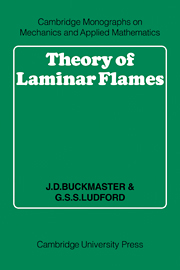Book contents
- Frontmatter
- Contents
- Preface
- 1 Governing equations of combustion
- 2 The premixed plane flame
- 3 Perturbations: SVFs and NEFs
- 4 Steady burning of a linear condensate
- 5 Unsteady burning of a linear condensate
- 6 Spherical diffusion flames
- 7 Cylindrical and spherical premixed flames
- 8 Multidimensional theory of premixed flames
- 9 Burners
- 10 Effects of shear and strain
- 11 Stability
- 12 Ignition and explosion
- Text references
- Further references
- Citation Index
- Subject Index
2 - The premixed plane flame
Published online by Cambridge University Press: 05 May 2010
- Frontmatter
- Contents
- Preface
- 1 Governing equations of combustion
- 2 The premixed plane flame
- 3 Perturbations: SVFs and NEFs
- 4 Steady burning of a linear condensate
- 5 Unsteady burning of a linear condensate
- 6 Spherical diffusion flames
- 7 Cylindrical and spherical premixed flames
- 8 Multidimensional theory of premixed flames
- 9 Burners
- 10 Effects of shear and strain
- 11 Stability
- 12 Ignition and explosion
- Text references
- Further references
- Citation Index
- Subject Index
Summary
Models of mixtures
In general, two-reactant flames can be classified as diffusion or premixed. In a premixed flame the reactants are constituents of a homogeneous mixture that burns when raised to a sufficiently high temperature. In a diffusion flame the reactants are of separate origin; burning occurs only at a diffusion-blurred interface.
Both kinds of flames can be produced by a Bunsen burner. If the air hole is only partly open, so that a fuel-rich mixture of gas and air passes up the burner tube, a thin conical sheet of flame (typically blue-green in color) stands at the mouth; this is a premixed flame. Any excess gas escaping downstream mixes by diffusion with the surrounding atmosphere and burns as a diffusion flame (typically blue-violet). If the air hole is closed, only the diffusion flame is seen; if all the oxygen is removed from the atmosphere (but not from the air entering the hole), only the premixed flame is observed. (Yellow coloring due to carbon-particle luminosity may also be seen.)
A premixed flame can also be obtained by igniting a combustible mixture in a long uniform tube; under the right conditions, a flame propagates down the tube as a (more or less) steady process, called a deflagration wave. The Bunsen burner brings such a wave to rest by applying a counterflow and stabilizes it with appropriate velocity and thermal gradients.
- Type
- Chapter
- Information
- Theory of Laminar Flames , pp. 20 - 37Publisher: Cambridge University PressPrint publication year: 1982

